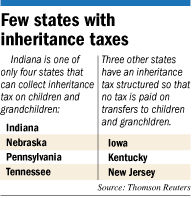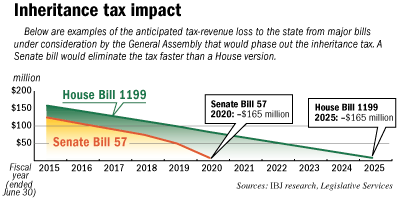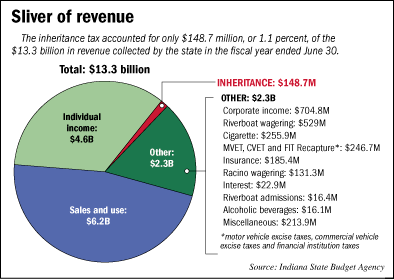Subscriber Benefit
As a subscriber you can listen to articles at work, in the car, or while you work out. Subscribe Now
 State legislators and estate-planning attorneys have renewed a push to repeal the inheritance tax in Indiana, one of just eight states to have such a levy.
State legislators and estate-planning attorneys have renewed a push to repeal the inheritance tax in Indiana, one of just eight states to have such a levy.
Rep. Eric Turner, R-Cicero, and Sen. Jim Banks, R-Columbia City, filed bills this year that would phase out the tax over five or 10 years.
The bills follow a consistent stream of efforts over the last three decades to repeal the tax in Indiana. But this year, proponents say they could have momentum.
That’s partly because the question of how the lost revenue from the tax—$150 million per year on average—would be replaced seems to have a more definitive answer.
Sen. Luke Kenley, a Noblesville Republican and key budget architect, has pointed to the revenue gain from a potential new tax on Internet sales as a substitute. He’s been heavily involved in lobbying for an Internet sales tax at the federal level and said recently that traction has increased on the issue.
There’s also been increased conversation about the ease with which older, wealthy people with homes in both Indiana and inheritance-tax-free states such as Florida transfer their residences to avoid paying the tax.
“We have a lot of Indiana residents who are moving to Florida because they don’t have any inheritance tax and they don’t have income tax,” Kenley said. “I know way too many people who have done it from Hamilton County. These are people we need in our community and in our state.”
Those who support nixing the tax also contend it is time-consuming and costly to file returns. In some cases, filing the paperwork costs more than the tax itself.
Repeal critics, on the other hand, say the loss of tax revenue from wealthy migrants isn’t significant enough to merit the obvious loss that would come from immediate repeal.
And until a source of guaranteed revenue replacement is identified, change is unlikely.
“It’s not a popular tax. It’s inefficient, it costs a lot of money to comply with,” said Jeff Dible, a partner and estate planning attorney with the Indianapolis office of Cincinnati-based Frost Brown Todd LLC. “[But] it does bring in significant revenue. The big problem always has been, ‘Where are we going to find replacement revenue?’”
Cumbersome process
Those receiving money or property from a deceased person pay inheritance taxes on the assets. Children of the deceased are exempted from paying taxes on the first $100,000 they receive but pay a rate starting at 1 percent and gradually increasing, based on the amount of the gift, to 10 percent.
Meanwhile, siblings of the deceased get a much smaller deduction—$500—and pay rates from 7 percent to 15 percent. Other recipients get a $100 deduction and encounter rates of 10 percent to 20 percent.
Of states with inheritance taxes calculated for each beneficiary, Indiana is the only one that doesn’t exempt children and grandchildren when the overall estate value is too small to require filing a federal estate tax return. It also provides lower exemption thresholds and higher rates for siblings and other beneficiaries, according to an analysis Dible prepared.
 Trust lawyer Jeff Kolb estimates there have been 16 attempts to kill the tax since he started working on a repeal in 1979. The issue of replacement revenue always has been the stumbling block.
Trust lawyer Jeff Kolb estimates there have been 16 attempts to kill the tax since he started working on a repeal in 1979. The issue of replacement revenue always has been the stumbling block.
About 92 percent of the money collected from the tax benefits the state, while the other 8 percent goes to counties. County assessors and circuit courts process the filings, while the Revenue Department audits them.
Critics of the inheritance tax say that multi-step process is cumbersome. It’s also unreliable, since death rates and wealth levels of the deceased vary from year to year, so the state provides counties a guaranteed amount of revenue to cover processing costs.
Those paying the tax also have to tackle the hassle and cost of filing the return—even if the tax is minuscule. A non-relative receiving $101 from a deceased person would pay 10 cents on the $1 taxed after exemption, but also would incur fees of $750 to more than $1,000 to file the returns.
“Lawyers oftentimes are the ones who feel the backlash from the taxpayer,” said Kolb, a partner with Vincennes-based Emison Doolittle Kolb & Roellgen LLP. “All [taxpayers] know is, it costs money. Lawyers oftentimes catch the blame for a very bad tax.”
Small impact?
A more troubling consequence of the tax, according to some, is the incentive it provides for elderly people to move to another state.
Lawyers and tax preparers say they know several people with second homes in other states who extend their stays there to more than six months in order to transfer residency to those states and skip out on the tax.
 “If you’re talking about saving hundreds of thousands for your children, it doesn’t seem like a very difficult decision,” said Bill Pope, a partner in the estate planning group at Indianapolis-based law firm Barnes & Thornburg LLP.
“If you’re talking about saving hundreds of thousands for your children, it doesn’t seem like a very difficult decision,” said Bill Pope, a partner in the estate planning group at Indianapolis-based law firm Barnes & Thornburg LLP.
In 2009, Kolb informally polled 1,200 members of the Indiana Bar Association’s Probate Trust and Real Property Section list-serve to ask how many clients they could recall changing residences from Indiana to other states. Eighty-four respondents reported 1,406 individuals had left, worth an estimated $3.4 billion in cumulative assets.
Robert Tannenwald, a public policy lecturer at Brandies University who studied the taxation-migration connection while at the Center on Budget and Policy Priorities, said studies have shown inheritance taxes having a statistically significant impact on residents’ decisions to move states. And the people most inclined to move are elderly and wealthy individuals who are likely to own a second residence, Tannenwald said.
However, he said, many also have community ties that keep them from moving. And the tax impact of the elite elderly migration is often overestimated because that population is relatively minute.
“The issue for the state is, ‘What is the size of that economic loss?’” Tannenwald said. “The best studies show the negative impact is small.”
Tannenwald said elected officials should consider the size of that impact before electing to miss out on revenue—and potentially cutting services as a result.
Andrew Berger, government affairs director for the Association of Indiana Counties, agrees.
While the amount counties receive from the inheritance tax is tiny—$20 million among all 92 counties—they can’t afford to lose those resources in a time of budget constraints, he said.
But lawmakers have made it clear any action without a defined revenue replacement would be gradual.
For example, under Turner’s plan, taxpayers would receive a credit that would start at 10 percent and grow 10 percent every year until the tax expired. That could cost $15 million in the first year, but Turner said it would be balanced by state revenue that has grown with the improving economy.
Passing such a measure, he said, is crucial to helping the state compete.
“There are plenty of states that don’t have an inheritance tax, and it doesn’t take much encouragement for a family that likes warm weather to establish residency in Florida or another warm-weather climate,” Turner said. “Then they take everything with them.”•
Please enable JavaScript to view this content.
